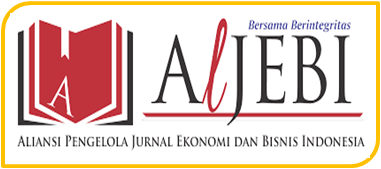Corporate Social Responsibility and Spirituality: Islamic Perspective
Abstract
Keywords
Full Text:
PDFReferences
Abdelgawad, S. G., & Zahra, S. A. (2020). Family Firms’ Religious Identity and Strategic Renewal. Journal of Business Ethics, 163(4), 775–787. https://doi.org/10.1007/s10551-019-04385-4
Aguinis, H., & Glavas, A. (2012). What We Know and Don’t Know About Corporate Social Responsibility: A Review and Research Agenda. Journal of Management, 38(4), 932–968. https://doi.org/10.1177/0149206311436079
Antolín-López, R., Delgado-Ceballos, J., & Montiel, I. (2016). Deconstructing corporate sustainability: a comparison of different stakeholder metrics. Journal of Cleaner Production, 136, 5–17. https://doi.org/10.1016/j.jclepro.2016.01.111
Arksey, H., & O’Malley, L. (2005). Scoping studies: Towards a methodological framework. International Journal of Social Research Methodology: Theory and Practice, 8(1), 19–32. https://doi.org/10.1080/1364557032000119616
Astrachan, J. H., Binz Astrachan, C., Campopiano, G., & Baù, M. (2020). Values, Spirituality and Religion: Family Business and the Roots of Sustainable Ethical Behavior. Journal of Business Ethics, 163(4), 637–645. https://doi.org/10.1007/s10551-019-04392-5
Barbera, F., Shi, H. X., Agarwal, A., & Edwards, M. (2020). The Family That Prays Together Stays Together: Toward a Process Model of Religious Value Transmission in Family Firms. Journal of Business Ethics, 163(4), 661–673. https://doi.org/10.1007/s10551-019-04382-7
Barron, K., & Chou, S. Y. (2017a). Spirituality and social responsibility performance: The perspectives of religiously and non-religiously affiliated individuals. Journal of Global Responsibility, 8(1), 63–82. https://doi.org/10.1108/JGR-07-2016-0020
Barron, K., & Chou, S. Y. (2017b). Toward a spirituality mode of firm sustainability strategic planning processes. Society and Business Review, 12(1), 46–62. https://doi.org/10.1108/sbr-01-2016-0008
Baumgartner, R. J. (2014). Managing corporate sustainability and CSR: A conceptual framework combining values, strategies and instruments contributing to sustainable development. Corporate Social Responsibility and Environmental Management, 21(5), 258–271. https://doi.org/10.1002/csr.1336
Bhatnagar, N., Sharma, P., & Ramachandran, K. (2020). Spirituality and Corporate Philanthropy in Indian Family Firms: An Exploratory Study. Journal of Business Ethics, 163(4), 715–728. https://doi.org/10.1007/s10551-019-04394-3
Bruch, H., & Walter, F. (2005). The keys to rethinking corporate philanthropy. MIT Sloan Management Review, 47(1).
Burke, L., & Logsdon, J. M. (1996). How Corporate Social Responsibility Pays Off. Long Range Planning, 29(4), 495–502. https://doi.org/10.1016/0024-6301(96)00041-6
Carroll, A. B. (1991). The pyramid of corporate social responsibility: Toward the moral management of organizational stakeholders. Business Horizons, 34(4). https://doi.org/10.1016/0007-6813(91)90005-G
Carroll, A. B. (2017). A three-dimensional conceptual model of corporate performance. Corporate Social Responsibility, 4(4), 37–45. https://doi.org/10.5465/amr.1979.4498296
Çetin, M. (2021). The relation between religiosity, family cohesion and ethical leadership: a study of family firms in Turkey. Journal of Family Business Management, 11(4), 333–354. https://doi.org/10.1108/JFBM-02-2020-0017
Chen, C. H., & Wongsurawat, W. (2011). Core constructs of corporate social responsibility: A path analysis. Asia-Pacific Journal of Business Administration, 3(1), 47–61. https://doi.org/10.1108/17574321111116397
Dusuki, Asraf; Abdullah, N. (2017). Maqasid al-Shari`ah, Maslahah, and Corporate Social Responsibility. The American Journal of Islamic Social Sciences, 24(01). http://www.scirp.org/journal/doi.aspx?DOI=10.4236/ib.2014.63013
Dusuki, A. W., Sciences, M., & Box, P. O. (2008). Review of Islamic Economics , Volume 12 , Number 1 , May 2008 What Does Islam Say About Corporate Social Responsibility ( CSR )? Author : Review Literature And Arts Of The Americas, 12(1), 1–28.
Freeman, R. E. E., & McVea, J. (2005). A Stakeholder Approach to Strategic Management. SSRN Electronic Journal, January. https://doi.org/10.2139/ssrn.263511
Ghobadian, A., Money, K., & Hillenbrand, C. (2015). Corporate Responsibility Research: Past—Present—Future. Group and Organization Management, 40(3), 271–294. https://doi.org/10.1177/1059601115590320
Kavas, M., Jarzabkowski, P., & Nigam, A. (2020). Islamic Family Business: The Constitutive Role of Religion in Business. Journal of Business Ethics, 163(4), 689–700. https://doi.org/10.1007/s10551-019-04384-5
Matten, D., & Moon, J. (2008). “Implicit” and “explicit” CSR: A conceptual framework for a comparative understanding of corporate social responsibility. Academy of Management Review, 33(2), 404–424. https://doi.org/10.5465/AMR.2008.31193458
Mazereeuw-van der Duijn Schouten, C., Graafland, J., & Kaptein, M. (2014). Religiosity, CSR Attitudes, and CSR Behavior: An Empirical Study of Executives’ Religiosity and CSR. Journal of Business Ethics, 123(3), 437–459. https://doi.org/10.1007/s10551-013-1847-3
McWilliams, A., & Siegel, D. (2000). Corporate social responsibility and financial performance: Correlation or misspecification? Strategic Management Journal, 21(5). https://doi.org/10.1002/(SICI)1097-0266(200005)21:5<603::AID-SMJ101>3.0.CO;2-3
Mitchell, R. K., Robinson, R. E., Marin, A., Lee, J. H., & Randolph, A. F. (2013). Spiritual identity, stakeholder attributes, and family business workplace spirituality stakeholder salience. Journal of Management, Spirituality and Religion, 10(3), 215–252. https://doi.org/10.1080/14766086.2012.758054
Moura-Leite, R. C., & Padgett, R. C. (2011). Historical background of corporate social responsibility. Social Responsibility Journal, 7(4), 528–539. https://doi.org/10.1108/1747111111117511
Obalola, M. (2008). Beyond philanthropy: Corporate social responsibility in the Nigerian insurance industry. Social Responsibility Journal, 4(4), 538–548. https://doi.org/10.1108/17471110810909939
Pieper, T. M., Williams, R. I., Manley, S. C., & Matthews, L. M. (2020). What Time May Tell: An Exploratory Study of the Relationship Between Religiosity, Temporal Orientation, and Goals in Family Business. Journal of Business Ethics, 163(4), 759–773. https://doi.org/10.1007/s10551-019-04386-3
Porter, M. E., & Kramer, M. R. (2006). Strategy & society: The link between competitive advantage and corporate social responsibility. Harvard Business Review, 84(12). https://doi.org/10.1108/sd.2007.05623ead.006
Torelli, R. (2020). Sustainability, responsibility and ethics: different concepts for a single path. Social Responsibility Journal, 2019. https://doi.org/10.1108/SRJ-03-2020-0081
Yusof, M., Mohd Nor, L., & Edward Hoopes, J. (2014). Virtuous CSR: an Islamic family business in Malaysia. Journal of Family Business Management, 4(2), 133–148. https://doi.org/10.1108/JFBM-07-2013-0016DOI: https://doi.org/10.18860/miec.v3i2.26179
Refbacks
- There are currently no refbacks.

This work is licensed under a Creative Commons Attribution-ShareAlike 4.0 International License.
Editorial Office:
Megawati Soekarnoputri Building
Faculty of Economics
Jln. Gajayana 50 Telp (0341) 558881
E-mail: m-iecjournal@uin-malang.ac.id
UIN Maulana Malik Ibrahim Malang
Member of:
Indexed by:
Maliki Islamic Economics Journal under a CC BY SA 4.0 International License.
View My Stats


























